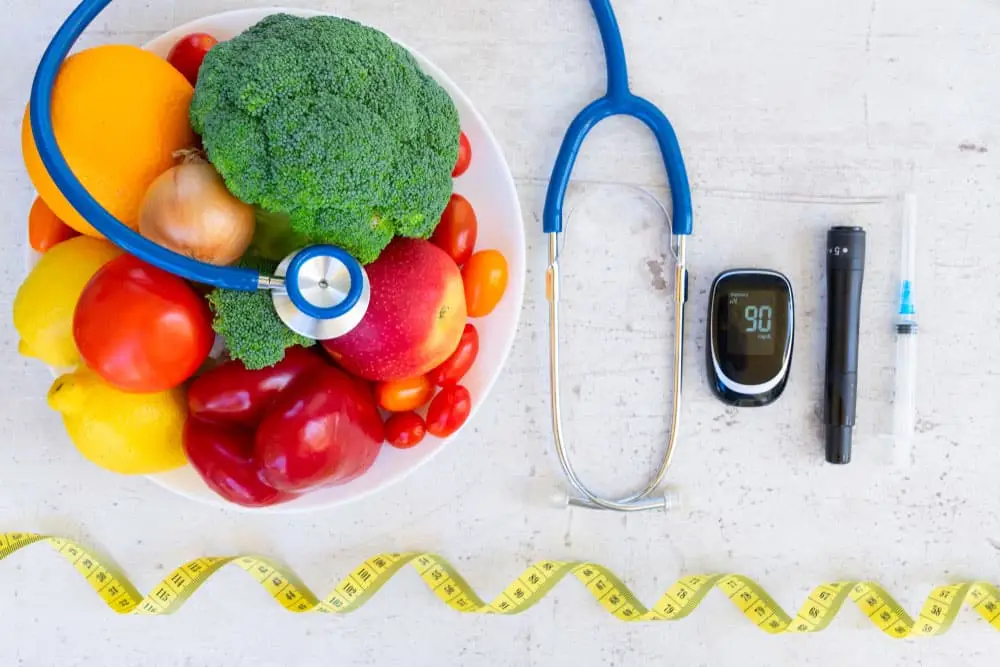Are you feeling like your body’s not listening to you anymore? Like no matter what you do, it just doesn’t seem to use energy the right way? This could be a sign of insulin resistance, a condition where your body isn’t responding properly to insulin. While being insulin resistant doesn’t mean you’re diabetic right now, it’s like standing at a crossroads. Without taking action, there’s a real risk of heading down the path to diabetes. But here’s the hopeful part: it is entirely possible to reverse insulin resistance, and we’re here to guide you through it.
In this blog, we’ll unfold a plan to reverse insulin resistance, taking you through the most effective diet adjustments, vital nutrients, and lifestyle changes that can champion your body’s response to insulin. So, gear up for some insightful tips and strategies—it’s time to steer away from the diabetes crossroads and get your health back on the right track.
Contents
Understanding Insulin Resistance
 Insulin resistance is a metabolic condition characterized by a diminished ability of the body’s cells to respond effectively to insulin, a hormone produced by the pancreas that plays a vital role in glucose metabolism.
Insulin resistance is a metabolic condition characterized by a diminished ability of the body’s cells to respond effectively to insulin, a hormone produced by the pancreas that plays a vital role in glucose metabolism.
Before delving into insulin resistance, it’s important to understand insulin’s function.
Insulin facilitates the uptake of glucose from the bloodstream into the cells, where it’s converted into energy or stored for future use. This process helps regulate blood sugar levels and ensures that the body has a consistent energy supply.
In individuals with insulin resistance, the cells in the muscles, fat, and liver respond poorly to insulin and struggle to absorb glucose. As a result, the pancreas is prompted to produce more insulin to help glucose enter the cells. This compensatory increase in insulin production can maintain normal blood glucose levels for a time, but eventually, the pancreas may not be able to keep up.
The resulting elevated levels of glucose and insulin in the bloodstream are hallmark signs of insulin resistance and can lead to prediabetes, type 2 diabetes, and other associated health complications if not addressed.
Therefore, reversing insulin resistance is critical for restoring the body’s natural glucose metabolism process, preventing the progression to type 2 diabetes, and promoting overall metabolic health.
Ways To Reverse Insulin Resistance Quickly!
Eat a Balanced Diet
 Diet plays a pivotal role in managing and potentially reversing insulin resistance by directly influencing the body’s insulin sensitivity. The right dietary choices can help stabilize blood sugar levels, reduce insulin demands, and promote overall metabolic health.
Diet plays a pivotal role in managing and potentially reversing insulin resistance by directly influencing the body’s insulin sensitivity. The right dietary choices can help stabilize blood sugar levels, reduce insulin demands, and promote overall metabolic health.
Here are key dietary principles and specific foods that can support these goals:
- Choose Low-Glycemic Index Foods: Examples include whole grains, legumes, nuts, seeds, most fruits, and non-starchy vegetables.
- Incorporate Healthy Fats: Monounsaturated and polyunsaturated fats can improve insulin sensitivity. Focus on sources like avocados, olive oil, nuts, seeds, and fatty fish rich in omega-3 fatty acids, such as salmon and mackerel.
- Select High-Fiber Foods: Foods high in fiber include oats, barley, beans, lentils, berries, and broccoli.
- Moderate Protein Intake: Opt for lean protein sources, including poultry, fish, tofu, and legumes.
- Limit Added Sugars and Refined Carbs: Minimize intake of sugary beverages, sweets, and white bread products.
- Emphasize Whole Foods: A diet centered around whole, minimally processed foods provides a rich array of nutrients necessary for maintaining insulin sensitivity and overall health.
- Consider Meal Timing and Frequency: Regular, balanced meals can help maintain stable blood sugar levels throughout the day. Some individuals may also benefit from time-restricted eating or intermittent fasting strategies under medical guidance.
- Stay Hydrated: Proper hydration is essential for metabolic processes, including insulin sensitivity. Choose water or other unsweetened beverages as your primary fluids.
By making informed dietary choices, individuals can significantly influence their insulin sensitivity and take a proactive step toward reversing insulin resistance.
Do More Physical Activity
 Regular physical activity is a powerful tool in improving insulin sensitivity and reversing insulin resistance. Here’s how various forms of physical activity contribute to this process:
Regular physical activity is a powerful tool in improving insulin sensitivity and reversing insulin resistance. Here’s how various forms of physical activity contribute to this process:
- Aerobic Exercise: Activities such as walking, running, cycling, and swimming increase the heart rate and promote the use of glucose by muscles for energy.
- Strength Training: Building muscle through strength training exercises, such as weight lifting or bodyweight resistance exercises, is especially beneficial for insulin resistance.
- Flexibility and Balance Training: While more directly beneficial for overall fitness and injury prevention, activities that enhance flexibility and balance, such as yoga and Pilates, also contribute to stress reduction.
- High-Intensity Interval Training (HIIT): This form of training can significantly improve insulin sensitivity by enhancing muscular ability to utilize glucose, even with shorter workout durations.
Regular exercise can significantly impact your body’s ability to manage glucose and combat insulin resistance. By choosing activities you enjoy and making physical activity a regular part of your life, you can take a proactive step toward reversing insulin resistance and promoting overall metabolic health.
Wrapping this up, remember that beating insulin resistance is totally doable with some smart changes in how you eat, move, sleep, and deal with stress. It’s all about taking small steps every day towards a healthier you.
Want to say goodbye to diabetes worries? Check out our online diabetes program. We’ve got everything you need to turn things around – personalized diet plans, exercises, and a team of dieticians and health coaches ready to cheer you on.
FAQs
1. Can insulin resistance be fully reversed?
Yes, in many cases, insulin resistance can be fully reversed, especially when identified early and addressed through lifestyle changes. Adopting a healthy diet, regular physical activity, effective stress management, and ensuring quality sleep can significantly improve insulin sensitivity. The extent of reversal can depend on individual factors, including genetics, the duration of insulin resistance, and adherence to lifestyle modifications.
2. What are the warning signs of insulin resistance?
The warning signs of insulin resistance can be subtle and easily overlooked. Key indicators include:
- Fatigue: Feeling unusually tired, especially after meals.
- Increased Hunger: Experiencing hunger shortly after eating.
- Weight Gain: Particularly around the abdomen, despite efforts to maintain a healthy diet and exercise routine.
- Difficulty Losing Weight: Struggling to lose weight, even with calorie restriction and regular exercise.
- Skin Changes: The development of dark, velvety patches of skin, known as acanthosis nigricans, often around the neck or armpits.
Recognizing these signs early and consulting with a healthcare provider can help prevent the progression of insulin resistance to more serious health issues.
3. Signs that insulin resistance is reversing
As you adopt lifestyle changes aimed at reversing insulin resistance, you might notice several positive changes indicating improvement:
- Stabilized Blood Sugar Levels: Blood sugar levels become more consistent and easier to manage.
- Increased Energy: Reductions in fatigue, with more stable energy throughout the day.
- Weight Loss: Especially losing abdominal fat, becomes more achievable.
- Improved Lab Results: Blood tests showing lower fasting glucose and improved lipid profiles.
- Better Overall Well-being: Enhancements in mood and cognitive function, as well as a general feeling of improved health.




